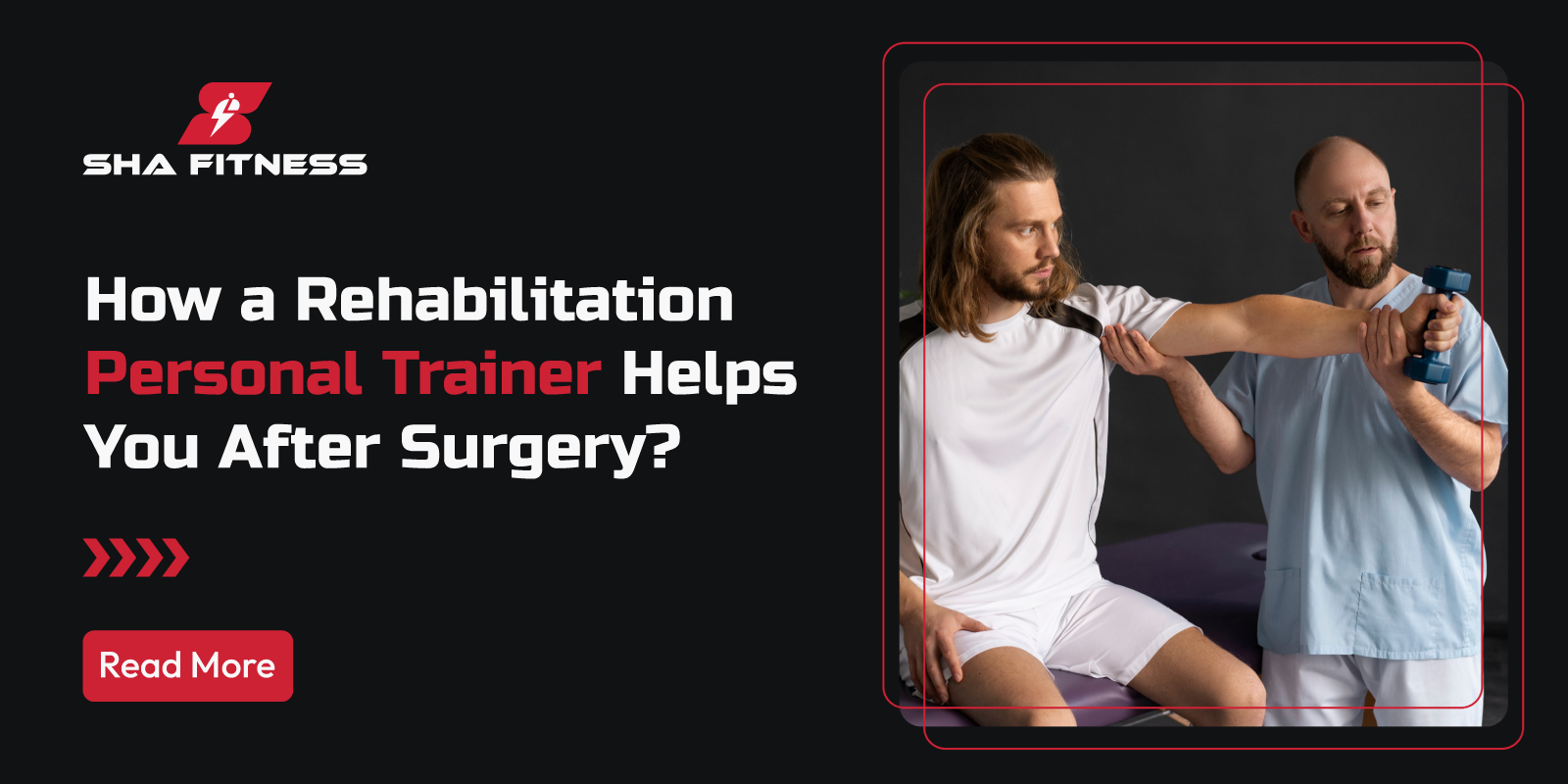Ever been told you're “recovered” but still feel nothing like yourself?
Surgery may have resolved the issue on paper, but real recovery goes far beyond hospital discharge notes. Once you leave the operating room, your body begins a longer, more personal journey: rebuilding strength, mobility, and the confidence to trust your body again.
You might be cleared by your doctor. You might have wrapped up your physical therapy. And yet your daily movements still feel limited, uncomfortable, or scary.
That’s exactly where a rehabilitation personal trainer steps in.
Because healing is not just about being “okay.” It’s about becoming fully you again.
Why Your Recovery Still Needs Guidance After PT Ends?

Physical therapy helps you manage pain, restore basic movement, and begin the healing process.
But what happens after that?
The recovery process can feel disjointed. One day you're in the hospital, the next you’re doing limited physical therapy sessions, and then you're on your own. No one tells you how to safely return to your daily life. Lifting your child still feels risky. Walking up the stairs makes you hesitate. And returning to the sport or hobby you love? That still feels out of reach.
This gap between clinical rehab and real-life strength is where many people stall or re-injure themselves.
A rehabilitation personal trainer bridges that gap. They’re not just fitness experts, they understand post-surgical limitations, healing timelines, and how to rebuild the body with both patience and precision.
With their support, you can:
- Restore strength in muscles that weakened during recovery.
- Improve balance and control, so everyday movements feel steady again.
- Undo harmful compensation patterns that your body developed to cope.
- Move with confidence, using proper form that protects against reinjury.
Most importantly, they understand you’re not starting from zero, you’re starting from healing.
Personalised Plans That Help You Gain Strength

No two surgeries or recoveries are the same. An ACL repair requires a completely different approach than a shoulder reconstruction. Recovering from a C-section is not the same as healing from spinal surgery. Your body, your surgery, and your goals are unique, and your recovery plan should reflect that.
A rehabilitation personal trainer designs a strategy based on the type of procedure you’ve had, the stage of your recovery, your current physical condition, and any movement limitations you’re working with.
Just as importantly, they focus on your goals, whether that’s returning to sport, rebuilding lost strength, or simply being able to move through your day without fear or hesitation.
Rebuilding the Body with Purpose After Surgery
After surgery, your body naturally adapts but not always in ways that serve you long-term. Some muscles become dormant from inactivity, while others begin to overwork in an effort to compensate. Over time, these imbalances can lead to poor posture, reduced mobility, and even new injuries.
A skilled rehabilitation personal trainer knows how to identify these patterns and correct them safely. They’ll help you activate weakened muscles, restore proper alignment in your movement mechanics, and rebuild joint stability particularly in vulnerable areas like the knees, hips, or shoulders. Range of motion is gradually improved with techniques that honour your healing process. This focused retraining helps your body move the way it was meant to.
Overcoming Fear and Finding Confidence in Movement

Even when your surgeon says you’re good to go, your mind might tell a different story.
“What if I tear it again?”
“What if I move wrong?”
“What if I never get back to how I was?”
That kind of fear is completely normal and for many, it’s one of the biggest obstacles in recovery. A rehabilitation personal trainer provides the structure and safety you need to move forward with confidence. You’re never left to wonder if you're doing too much or too little. Their guidance goes beyond exercise, it’s about reassurance. Every session is a step toward rebuilding not just physical strength, but something just as important: your trust in your own body. You’re no longer navigating recovery alone, you have someone walking beside you, every step of the way.
Progress You Can See and Feel
One of the hardest parts of recovery is not knowing if you’re actually making progress.
When you’re healing from surgery, the days can blur together. You move, you rest, you try without structure, it can feel like you’re going in circles, unsure if anything’s really improving.
That’s where rehabilitation personal training changes everything.
You’re guided by a clear, supportive plan that tracks your progress and evolves with you.
Measurable milestones like mobility, strength, and balance tests show you exactly how far you’ve come.
Custom programming adjusts as your body grows stronger, so nothing feels stagnant.
Regular feedback keeps you focused, encouraged, and moves you forward.
Every gain is noticed. Every step forward is celebrated. Because in recovery, even the tiniest progress matters and it deserves to be seen.
It’s Not Just About the Body, It’s About Life

Surgery changes more than your body, it shifts how you feel inside it.
Recovery is not just a physical process. It’s deeply emotional.
You might feel frustrated by your limitations, impatient with the pace of healing or even disconnected from the body that once felt strong and capable. And there’s often quiet grief for the things you’ve had to pause. The long walks. The workouts. The weekend games with your kids. The feeling of freedom in your own skin.
A truly skilled rehabilitation personal trainer can understand that recovery is about more than reps and routines. It’s about helping you reconnect with your body, your confidence, and your life.
Whether your goal is to walk without pain, lift again, or feel strong enough to chase your kids around the garden, your rehab journey deserves a partner who honours both your physical limits and your emotional resilience.
Because the real goal is not just to “get better.” It’s to come back fully, freely, and stronger than before.
What to Look for in a Rehabilitation Personal Trainer?
Not all personal trainers are qualified for post-surgical clients. Here's what to look for:
Rehabilitation-focused certifications (NASM CES, ACE Medical Exercise, etc.)
Experience with your specific surgery or condition.
Willingness to coordinate with your medical team.
A slow, smart approach, never pushing through pain.
Healing is not just about what’s fixed, it’s about what’s rebuilt.
With the right support, you can rebuild strength, confidence, and a lifestyle you love.
Need rehab-based personal training after surgery in Chigwell or virtually?
Explore Sha Fitness Rehab Training Services and take the next step in your recovery with expert support that’s as personal as your journey.



































